Made up of 98-99% of water, your spit holds proteins, hormones, and genetic material that gives clues to how well your body is functioning. Aiding in digestion and oral health, it can point to diseases and track your reproductive health. So if something is wrong with the texture, quantity, or color of your saliva, then something might be seriously wrong with your health. Here are some signs below.
Note: Content is provided for informational purposes only and is not intended as a substitute for medical advice. Seek guidance from your doctor regarding your health and medical conditions.
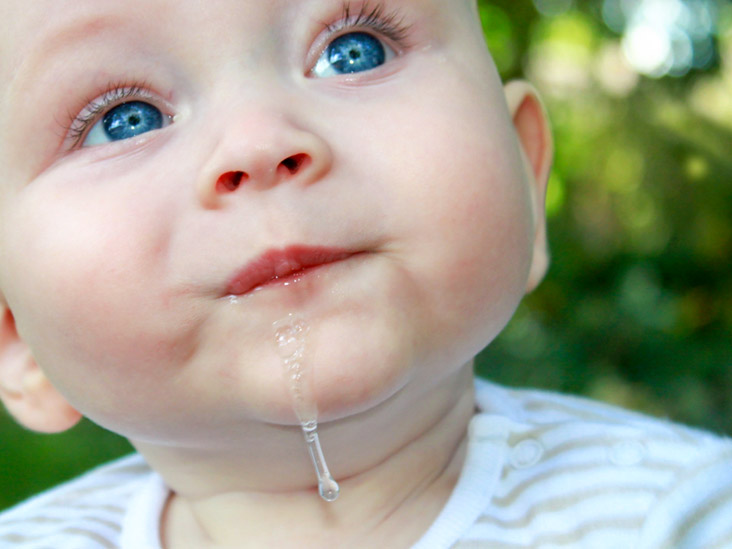
1. You’re low on spit.
When your mouth doesn’t produce enough saliva, you’re experiencing dry mouth, also known as Xerostomia. It could indicate that you’re dehydrated, or it could be an after effect of certain medication such as blood pressure medications, antidepressants, as well as some pain and anxiety medication.
It’s usual for people to experience a dry mouth every now and then, but other symptoms that usually come with prolonged Xerostomia are:
- Pain or burning in your mouth or throat;
- Rough tongue;
- Spit can be sticky, thick, or stringy — white and sticky saliva is common in cancer patients getting treatment;
- Trouble chewing, swallowing, or speaking;
- Persistent bad breath even after brushing your teeth;
- Cracked, chapped lips;
- Teeth are loose;
- Mouth ulcers;
- Or new or larger spaces in the teeth.

Dry mouth can also indicate an autoimmune condition known as Sjogren’s syndrome — an immune system disorder that results in dry eyes and mouth. Another common condition with dry mouth as a symptom is diabetes. It could indicate high blood sugar and is usually the first noticeable symptom of diabetes in people.
Other common causes include: Nerve damage affecting the salivary glands, lack of sufficient hydration, undergoing dialysis for kidney problems, frequently breathing through your mouth, certain health conditions, such as HIV, AIDS, and Sjogren’s syndrome, tobacco use, use of specific medications, including those for cancer, high blood pressure, depression, bladder issues, and experiencing stress.
Seek medical attention quickly if you have diabetes and on top of dry mouth, you’re experiencing bleeding from the teeth or mouth, loose teeth, a mouth ache, sores in your mouth, or trouble chewing, swallowing, or speaking.
What you can do to treat it: Staying hydrated by sipping cold water throughout the day and having some by your bedside at night will help with the discomfort that dry mouth causes, as well as brushing teeth twice a day and using alcohol-free mouthwash. Chewing sugar-free gum or sucking on ice can help you increase your saliva production. Dry mouth can typically be efficiently treated by following basic daily oral health practices.
2. You have too much saliva.
Hypersalivation is the term for having so much saliva that could cause you to drool unintentionally. It may be temporary or chronic. Ad constant hypersalivation (sialorrhea), may indicate an underlying condition affecting muscle control. In older kids or adults, drooling could also point to a health issue.
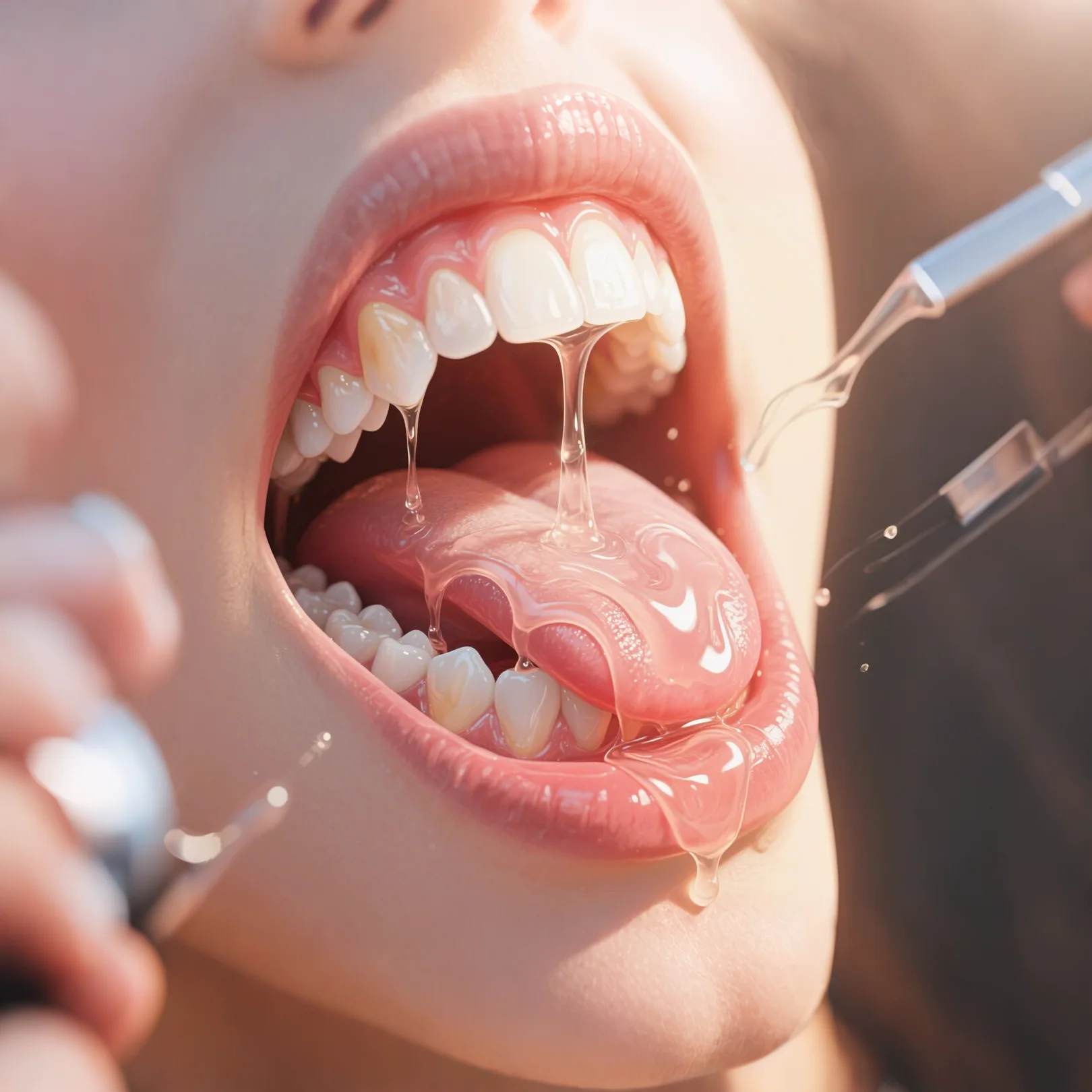
Your doctor can typically tell whether you have too much saliva by asking you about your symptoms. Sometimes tests may be required to determine the cause, and they may examine your mouth for symptoms of:
- swelling;
- bleeding;
- redness;
- or an unpleasant odor.
Excess saliva (hypersalivation) can occur for a variety of causes: Cavities, infections, acid reflux, pregnancy, certain medication, and exposure to dangerous substances such as mercury can all produce symptoms, but it normally improves after the problem is treated or, for pregnant women, after childbirth.
Persistent hypersalivation can be caused by long-term health issues that weaken muscular control, making it difficult to swallow and causing saliva to accumulate. This can occur due to a misaligned bite, an enlarged tongue, cerebral palsy, Parkinson’s disease, ALS, or following a stroke. In some circumstances, treating symptoms is critical, since excessive saliva can make it difficult to speak or eat correctly.
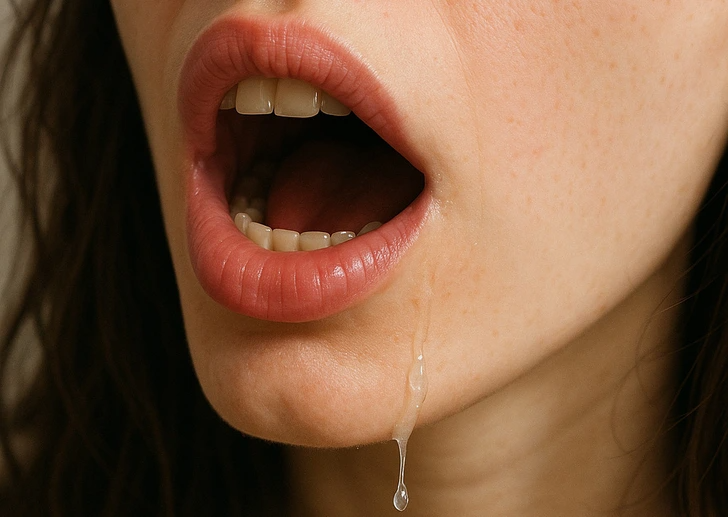
What you can do to treat it: see your doctor and if they think that cavities or infection is causing your symptoms, they may recommend you to visit a dentist. Brushing your teeth on a regular basis can help prevent gum inflammation and oral discomfort, both of which can promote drooling. For further benefits, you may choose to use an alcohol-based mouthwash afterward.
If you already have a long-term health problem, your doctor may use a scale to assess how severe your drooling is. This helps them decide how to best treat it.
3. Blood in your saliva
If you spit and notice blood in your saliva, sometimes it may be because you bit yourself, or you brushed too harshly. But sometimes it’s a sign of a serious underlying condition.
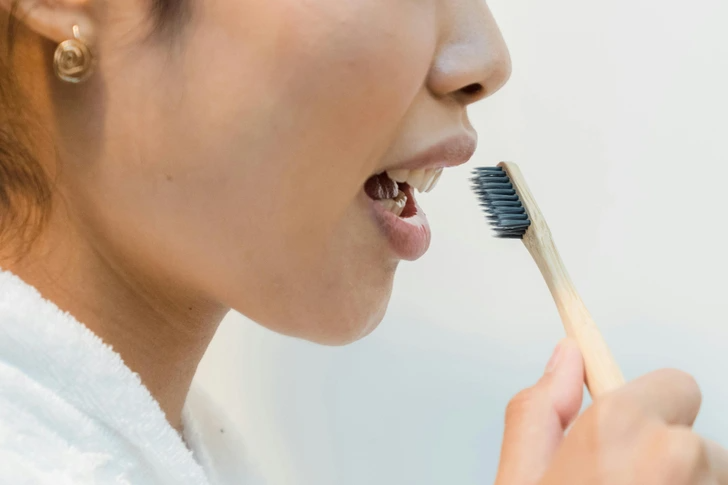
Why would your saliva have blood in it?
- Gingivitis
This is a common gum condition in which your gums get red, inflamed, and bleed, usually due to inadequate brushing or flossing habits. It can be treated with a professional dental cleaning and improved daily oral hygiene. In serious circumstances, surgery may be required. - Mouth ulcers (canker sores)
They are small, painful sores in your mouth, usually on the gums, lips, or cheeks. They can be caused by biting your cheek, brushing too hard, dental procedures, a lack of certain vitamins (such as B-12 or iron), or consuming hot or acidic meals. Some medical diseases, such as coeliac disease or immunological problems, might also cause them.
Treatment: Most mouth ulcers heal on their own, but if they are large or last more than a few weeks, your doctor may prescribe a special mouthwash or gels. Eating more foods that are high in folate, zinc, and B vitamins can also assist.
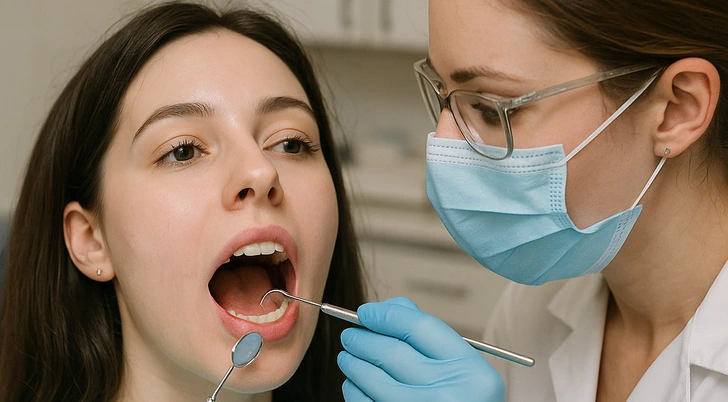
See your dentist for regular cleanings and exams every six months. Consider scheduling an immediate appointment if you experience symptoms like:
- Recurrent canker sores;
- Bleeding gums after brushing and flossing;
- Tender, swollen, or red gums;
- Gums tearing away from teeth;
- Loose teeth;
- Unusual sensitivity to temperature;
- And difficulty swallowing.
4. A bitter taste in your mouth
Your saliva allows you to swallow and taste, so a constant bitter taste in your mouth might mean that your saliva isn’t performing well. Taste is a complicated sense that can be influenced by many conditions, including poor oral hygiene, dry mouth, and pregnancy. Treating a chronic bitter taste requires treating any underlying illnesses, but people can alleviate the unpleasant taste with several simple home remedies in the meanwhile.

Dysgeusia is the medical term for experiencing changes to your taste, and it includes:
- bitter taste;
- sour or terrible taste;
- salty taste;
- and depending on the cause, other symptoms may be experienced.
Some causes include: dry mouth, dental issues, pregnancy, burning mouth syndrome (feeling a burning sensation in your mouth), menopause, acid reflux, oral thrush, pine nut syndrome (which happens after consuming pine nuts), stress and anxiety, nerve damage, medications and oral supplements, illnesses or cancer treatments.
While it’s common to experience an altered taste in your mouth, see a medical professional if the bitter taste is not going away. Treatment can be provided once the cause is known.
5. Your saliva is thick.
People may have thick saliva for a variety of reasons. One is breathing through the mouth. Another is dehydration, which can be brought on by heat, physical activity, or a medical condition.

Other serious causes of thick saliva might be:
- dehydration;
- breathing through the mouth — it exposes your mouth to the air, making it dry out;
- chemotherapy or radiation therapy for cancer;
- Sjogren disease;
- cystic fibrosis;
- or side effects of medications.
Seek medical help to reduce saliva in your mouth, but there are some things that you can do to get rid of thick saliva. These include breathing through your nose instead of your mouth, sipping water often, sucking sugar-free candy, avoiding dehydration, reducing caffeine intake or using artificial saliva.
Your saliva needs to do a good job

Saliva in your mouth is great for breaking down your food, controlling bacteria, providing minerals to teeth to make them stronger and rinsing acid and food particles from the teeth and gums. If this does not happen, there’s a high chance of getting: cavities (tooth decay), gingivitis (mild gum inflammation), oral infections, periodontitis (advanced gum disease), build-up of dental plaque, thrush (a yeast infection in the mouth) or tooth deterioration.
So keep an eye on any changes in your saliva.
Source: brightside.me







